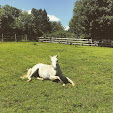1. The Book of Ruth - While I value the Bible as a whole text, the story of Ruth is one of the few that speaks to me on a personal level. Not just because Ruth, like me, converted to Judaism, but the nature of her conversion. It manages to demonstrate, at all once, her personal loyalty to her mother-in-law Naomi, her joining the Jewish people, and her connection to G-d. In addition to the conversion aspect, Ruth's story is one of forging a new path in life at the earthly level (in marrying Boaz).
2. A Pigeon and a Boy - Part of my experience reading the novel was shaped by seeing its author, Meir Shalev, speak at Brandeis about his writing. Without giving away the story, one of my favorite things about this book was how it weaved the past and present — few authors can do that well, and Shalev made it feel like an unveiling rather than switching back and forth.
3. So Far from the Bamboo Grove - One of the only books I read in middle school that was worth reading; it's a memoir of the author's childhood in Korea during WWII. It managed to meaningfully illustrate a civilian's experience of war in a way that was accessible; not so hard to read that you end up shutting down, but painful enough to shock you into awareness.
4. My Sister's Keeper - Explores both the familial and medical ethics of the sisters' struggles beautifully and makes ethics feel much more real than any theoretical ethics text could.
5. The Red Tent - Recently I have found myself disgusted by the idea of retelling Dinah's rape as a misunderstood love story, but if you look it as Biblical-era fiction, Diamant's imagination of Dinah's life after Schehem is quite interesting.
6. Maus - Aside from the striking art, I found that Maus effectively showed the immediate and long-term experiences of survivors and their children without compromising either.
7. The Chosen - A great coming-of-age novel, without the cheesiness that seems to infest many coming-of-age novels and films.
8. The Screaming Room - A mother's memoir of her son Peter's losing battle with AIDS in the 1980s. If you weren't aware of how AIDS was viewed back then, read this. It is an (appropriately) agonizing read. First, it makes you weep. Then, it makes you angry. Angry because, despite the advances in treating AIDS and preventing HIV infection, in most of the world, people are still suffering and dying from AIDS the way Peter did over 20 years ago.
9. The Book of Psalms - What I have grown to love about psalms is that you can find a psalm for almost any situation. When you are overflowing with praise, weighed down with sadness, or searching for answers, you can open a book of psalms and find the words to talk to G-d about it.
10. Night
11. Ethan Frome - Probably the worst book I have ever read; each overdrawn metaphor felt worse than the last. The fact that it has been part of the standard American high school canon didn't make it any better.
12. The Tipping Point - In addition to the overall concept of the book, it was a lot of (educational!) fun to read the supporting examples, like the comparison of how Sesame Street and Blue's Clues approach children's learning styles.
13. Moral Grandeur and Spiritual Audacity
14. Nickled and Dimed - Breaks any illusions you had about minimum-wage jobs being compatible with current living expenses and social realities.
15. Jean de Florette/Manon des Sources - Wonderful French revenge/forgiveness tale. Breaks any illusions you had about "rural" values or the romanticism of farming as well, but in a very matter-of-fact, yet eloquent way.
